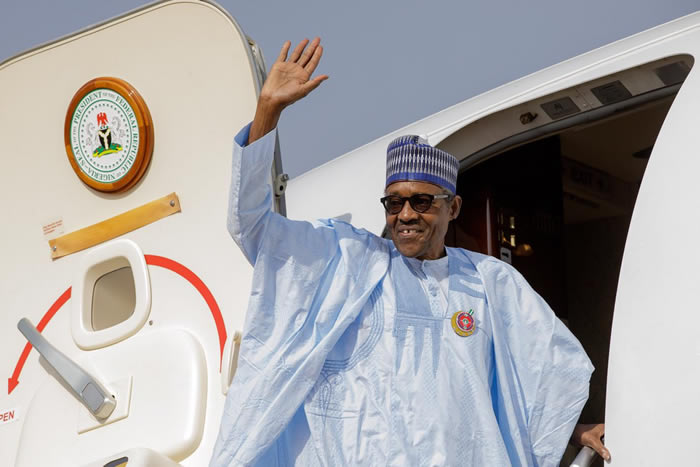Nigeria has moved forward under the President Muhammadu Buhari-led administration, in spite of the huge challenges it inherited, Amb. Samson Itegboje, Permanent Representative to the UN, said .
Itegboje made thos known during a Town Hall forum organised by the Nigerian Embassy in Washington, DC and the Nigerians in Diaspora Organisation (NIDO) U.S.
The theme of the forum is “The strength and voice of the Nigerian Diaspora’’.
The Envoys, however, said that the Buhari’s administration had been shy in publicising some of its achievements for the citizens to be properly informed.
“We are witnesses to the fact that prior to the coming of the government of President Buhari, the economy was almost grinding to a halt.
“In fact, President Muhamadu inherited a recessed economy waiting to happen.
“Boko Haram was running riots in the country and has even held sway in 14 local governments in Borno.
“Corruption had almost become normal and our infrastructure had decayed among others.
“But this government went to work and I must confess that the government appears to be publicity shy,’’ Itegboje said.
He reeled out some of the successes achieved so far in less than three years of the current administration, saying they are subject to verification.
“It takes three years for a country to exit recession but it took this government less than one years and a half to exit recession.
“Foreign reserves have peaked at about 43 billion dollars, the highest level in about four years and up from 24 billion dollars just a year ago.’’
He said the implementation of the Treasury Single Account (TSA) had stopped the haemorrhaging of the Treasury, adding that N108 billion had been saved from the removal of maintenance fees payable to banks pre-TSA.
“Nigeria rose 24 places on the World Bank’s Ease of Doing Business Ranking and earned a place on the list of 10 top performers in the world.
“According to third quarter 2017 figure, agriculture export is up year-on-year by 25 per cent while solid minerals export is up year-on-year by 78 per cent.
“Raw materials export is up 70 per cent year-on-year and manufactured goods export is up 22 per cent year-on-year while our non-crude oil earning amount to 40 per cent in foreign reserves,’’ the Envoy said.
According to him, government agencies like the Nigeria Customs Service and Joint Admission and Matriculation Board (JAMB) were reporting highest ever revenue collection.
He recalled that JAMB recently remitted N7.8 billion naira compared to a paltry N51 million between 2010 and 2016.
“Six million rice farmers in 2015 have grown to over 12 million farmers, leading to a reduction in rice importation from Thailand.
“Nigeria is the second largest producer of sorghum after the U.S., the third in millet after India and leads the world in yam and cassava production.
“Overall, the government’s ambition is that agriculture should rise from 25 per cent to 40 per cent of GDP so that we can banish poverty and overcome our economic anxiety’’.
He said power generation is at an all-time high of 7,000 megawatts while the Lagos-Kano, Lagos-Ibadan and Kano-Kaduna rails would be operational by 2019.
Similarly, 25 major highways are being rehabilitated while coastal rail from Lagos to Calabar is being negotiated.
According to Otegboje, while the positive indices may not have immediately impacted positively on Nigerians, the citizens will definitely get a new lease of life soon.
Mr Pierro Tozzi, Staff Director, U.S. Congress on Foreign Affairs, commended the giant strides of Nigerians in the U.S.
Tozzi, however, lamented about some of the challenges in their homeland.

A CROSS-SECTION OF NIGERIANS AT A WORKSHOP ORGANISED BY THE NIGERIANS IN DIASPORA ORGANISATION FOR THE NIGERIANS RESIDENT IN THE U.S. AT THE NIGERIAN EMBASSY, WASHINGTON, DC
He said the U.S. had continued to contribute to various sectors of Nigeria’s economy adding, however, that the U.S. Congress was concerned about the herdsmen attacks in the North-Central geo-political zone.
Mr Samuel Adewusi, Member, Board of Directors of NIDO USA, said the Diaspora Commission Act would coordinate Nigerians in the Diaspora to contribute human capital and material resources, including their expertise, for the development of Nigeria.
Adewusi said the Act provides a database of Nigerians in various fields and potentialities as the resource base for Nigeria to draw from, as well as protect the interest of all Nigerians.
Many participants at the event, condemned the system of government and the leaders for their political failure and challenged the leaders to be more accountable and responsible to the citizens.
They, however, pledged to continue to contribute their expertise to the development of Nigeria, adding “we have criticised ourselves enough’’.
The event, which drew Nigerians from across the U.S., also addressed issues of immigration and consular activities at Nigerian missions among others. (NAN)

